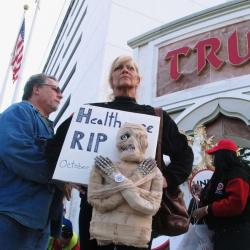
The workers protested outside Trump Taj Mahal in January 2016, after a court confirmed their loss of health and pension benefits.
Workers from the Local 54 of the Unite-HERE labor union protested outside the Tropicana Casino in Atlantic City on Friday. The worker protests come as the union begins what some describe as the toughest negotiation in 4 decades.
The reason it’s going to be the toughest negotiation yet is the simple fact there is not as much to go around as there once was. Atlantic City casinos general less than half as much in revenues than they did 10 years ago. With growing competition on all sides, fewer easterners visit Atlantic City to gamble each year. Most choose to stay at home for the local forms of gambling.
The job market in Atlantic City is among the worst in the country. Four Atlantic City casinos closed in 2014, putting 8,000 casino workers out of a job. Many left for job opportunities in other cities, but thousands others remained in the area. Of these, many continue to seek casino jobs.
$0.80 Wage Increase in Last 12 Years
The long term trends are bad for the union workers. Over the past 12 years, the Local 54 members have received only an 80-cent wage increase. The union gave away wage increases in negotiations in order to maintain their members’ health and pension benefits.
Now, it appears those long-protected health and pension benefits might be endangered. To rally public support and show their defiance of the attempts to take away their benefits, the Local 54 of Unite-HERE met outside the Tropicana on Friday.
Carl Icahn: A Symbol of Greed to the Workers
The Tropicana Casino was chosen as the protest site because it is owned by Carl Icahn. The billionaire investor inspires particular vitriol, because he took the union to a New Jersey court in October 2014 in order to strip the Trump Taj Mahal’s casino workers of their benefits — Carl Icahn owns that casino, too.
It is easy to paint Carl Icahn as a miser, but the businessman faces tough decisions in order to make a formerly bankrupt business profitable. Cuts in labor costs are often the first concessions which happen when new management takes over, especially when that management is taking over a bankrupt property.
For the past century, labor laws in the United States have stipulated that labor contracts are negotiated between management and the workers’ representative, the labor unions. New Jersey judges have begun in the last few years to take a different view. If courts can decide labor issues without a negotiation, it could undermine an already tenuous set of conditions for union workers.
Legal Jeopardy for Unions
Another danger looms. Atlantic City laws stipulate that conditions in all 8 casinos are supposed to be equal. If Trump Taj Mahal’s workers had their health and pension benefits taken from them, it means workers at the other 7 casinos might lose their benefits, too.
With Atlantic City facing a possible bankruptcy, its leaders are likely to cater to its remaining casino owners, because the gaming industry remains the biggest single employer in the city. If the casino industry fails, it could mean the failure of Atlantic City itself. It certainly would mean thousands of more employees without a job.
Loss of Benefits Led to Anger
Under those conditions, the Local 54’s negotiators are going to be under tremendous pressure to give concessions. Despite New Jersey being a left-leaning state, Atlantic City’s political and business leaders are likely to have similar opinions on the concessions the union leaders should make.
The loss of benefits has caused tremendous anger for the protesters. Casino jobs once were seen as a ticket to the American middle class. With the loss of benefits, it is hard to picture those same employees staying in the middle class. That is the trend with unskilled workers in the United States, but that trend is part of the reason so many American workers describe themselves as angry at the current economic situation in the country.
